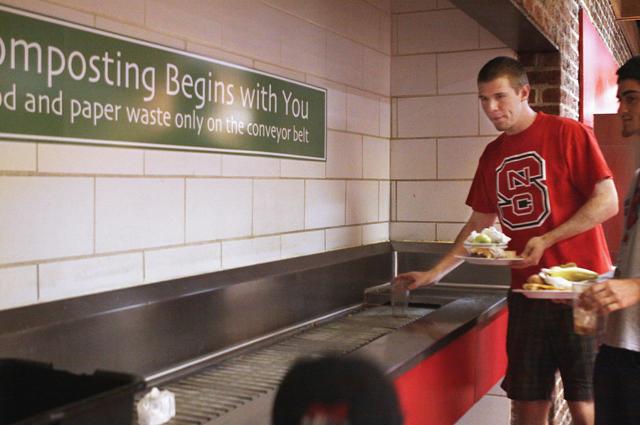University Dining and Waste Reduction and Recycling partnered to implement a composting initiative in campus dining hall facilities.
The University’s goal to divert 65 percent of campus waste from the landfill by 2015, according to Kevin Smith, director of dining hall operations.
Smith said although the composting campaign just started in August, the project has thus far proved a success.
“It’s been doing really well,” Smith said. “We actually just took off 4.19 tons of the first load off this past Monday.”
University Dining began composting in Fountain and Clark Dining Halls, Smith said, and will begin composting in Case Dining Hall this month.
The compost process will also reduce the possibility of contaminating the most material University Dining removed or is in the process or removing all plastic utensils and trash cans in the serving and seating areas, Smith said.
According to Smith, Dining had to make some changes in the dining halls such as replacing the ice cream cups with bowls.
“We removed the trashcan from the window so the people who are in the dish room are controlling where the trash goes but in case someone does put a bottle or something on the plate, they’ll catch it,” Smith said.
In January, a Waste Reduction and Recycling audit found a large amount of waste generated at Fountain Dining Hall was compostable, Smith said.
“When we did the audit we found out that 70 percent of the trash that were in the dumpsters in the dining hall was trash that could be composted,” Smith said.
Rebecca Roddenberry, dining and catering operations graphic designer and a senior in art and design said the University as a whole, seems to be moving towards sustainability.
“That could make a really big difference,” Roddenberry said.
Roddenberry said the University wanted to help students understand what was going on and why changes were being made in dining halls.
“The signage in the dining hall helped explained what to do with your plate when you’re done, being conscious about how much food you are putting on your plate, and how much food you are wasting and how to reduce your portion sizes,” Roddenberry said.
Miranda Beshears, a freshman in environmental engineering, said students probably don’t do as much composting as they would like.
“Stepping in by composting really gets it going and also teaching people what they need to do to help and how we can actually make a difference is really exciting,” Beshears said.
Beshears said it’s great to make a big impact such as students putting trash that would normally put in the trashcan in a compost bin.
“Composting puts a lot of nutrients in the soil so if all of that is going to the landfill it could be going in the soil so putting more nutrients in it,” Beshears said.
Roddenberry said understanding University Dining’s program and by getting the word out will help raise awareness.
“If students jump on board and help out and make a conscious effort to reduce waste, I think we will be able to hit that mark,” Roddenberry said.








